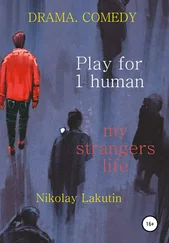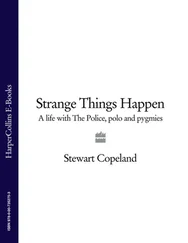Douglas Hofstadter - I Am a Strange Loop
Здесь есть возможность читать онлайн «Douglas Hofstadter - I Am a Strange Loop» весь текст электронной книги совершенно бесплатно (целиком полную версию без сокращений). В некоторых случаях можно слушать аудио, скачать через торрент в формате fb2 и присутствует краткое содержание. Жанр: Прочая документальная литература, на английском языке. Описание произведения, (предисловие) а так же отзывы посетителей доступны на портале библиотеки ЛибКат.
- Название:I Am a Strange Loop
- Автор:
- Жанр:
- Год:неизвестен
- ISBN:нет данных
- Рейтинг книги:4 / 5. Голосов: 1
-
Избранное:Добавить в избранное
- Отзывы:
-
Ваша оценка:
- 80
- 1
- 2
- 3
- 4
- 5
I Am a Strange Loop: краткое содержание, описание и аннотация
Предлагаем к чтению аннотацию, описание, краткое содержание или предисловие (зависит от того, что написал сам автор книги «I Am a Strange Loop»). Если вы не нашли необходимую информацию о книге — напишите в комментариях, мы постараемся отыскать её.
I Am a Strange Loop — читать онлайн бесплатно полную книгу (весь текст) целиком
Ниже представлен текст книги, разбитый по страницам. Система сохранения места последней прочитанной страницы, позволяет с удобством читать онлайн бесплатно книгу «I Am a Strange Loop», без необходимости каждый раз заново искать на чём Вы остановились. Поставьте закладку, и сможете в любой момент перейти на страницу, на которой закончили чтение.
Интервал:
Закладка:
Episodic Memory
When we sit around a table and shoot the breeze with friends, we are inevitably reminded of episodes that happened to us some time back, often many years ago. The time our dog got lost in the neighborhood. The time our neighbor’s kid got lost in the airport. The time we missed a plane by a hair. The time we made it onto the train but our friend missed it by a hair. The time it was sweltering hot in the train and we had to stand up in the corridor all the way for four hours. The time we got onto the wrong train and couldn’t get off for an hour and a half. The time when nobody could speak a word of English except “Ma-ree-leen Mon-roe!”, spoken with lurid grinning gestures tracing out an hourglass figure in the air. The time when we got utterly lost driving in rural Slovenia at midnight and were nearly out of gas and yet somehow managed to find our way to the Italian border using a handful of words of pidgin Slovenian. And on and on.
Episodes are concepts of a sort, but they take place over time and each one is presumably one-of-a-kind, a bit like a proper noun but lacking a name, and linked to a particular moment in time. Although each one is “unique”, episodes also fall into their own categories, as the previous paragraph, with its winking “You know what I mean!” tone, suggests. (Missing a plane by a hair is not unique, and even if it has happened to you only once in your life, you most likely know of several members of this category, and can easily imagine an unlimited number of others.)
Episodic memory is our private storehouse of episodes that have happened to us and to our friends and to characters in novels we’ve read and movies we’ve seen and newspaper stories and TV news clips, and so on, and it forms a major component of the long-term memory that makes us so human. Obviously, memories of episodes can be triggered by external events that we witness or by other episodes that have been triggered, and equally obviously, nearly all memories of specific episodes are dormant almost all the time (otherwise we would go stark-raving mad).
Do dogs or cats have episodic memories? Do they remember specific events that happened years or months ago, or just yesterday, or even ten minutes ago? When I take our dog Ollie running, does he recall how he strained at the leash the day before, trying to get to say “hi” to that cute Dalmatian across the street (who also was tugging at her leash)? Does he remember how we took a different route from the usual one three days ago? When I take Ollie to the kennel to board over Thanksgiving vacation, he seems to remember the kennel as a place, but does he remember anything specific that happened there the last time (or any time) he was there? If a dog is frightened of a particular place, does it recall a specific trauma that took place there, or is there just a generalized sense of badness associated with that place?
I do not need answers to these questions here, fascinating though they are to me. I am not writing a scholarly treatise on animal awareness. All I want is that readers think about these questions and then agree with me that some of them merit a “yes” answer, some merit a “no”, and for some we simply can’t say one way or the other. My overall point, though, is that we humans, unlike other animals, have all these kinds of memories; indeed, we have them all in spades. We recall in great detail certain episodes from vacations we took fifteen or twenty years ago. We know exactly why we are frightened of certain places and people. We can replay in detail the time we ran into so-and-so totally out of the blue in Venice or Paris or London. The depth and complexity of human memory is staggeringly rich. Little wonder, then, that when a human being, possessed of such a rich armamentarium of concepts and memories with which to work, turns its attention to itself, as it inevitably must, it produces a self-model that is extraordinarily deep and tangled. That deep and tangled self-model is what “I”-ness is all about.

CHAPTER 7
The Epi Phenomenon

As Real as it Gets
THANKS to the funneling-down processes of perception, which lead eventually — that is, in a matter of milliseconds — to the activation of certain discrete symbols in its brain, an animal (and let’s not forget robot vehicles!) can relate intimately and reliably to its physical environment. A mature human animal not only does a fine job of not slipping on banana peels and not banging into thorn-bristling rosebushes, it also reacts in a flash to strong odors, strange accents, cute babies, loud crashes, titillating headlines, terrific skiers, garish clothes, and on and on. It even occasionally hits curve balls coming at it at 80 miles an hour. Because an animal’s internal mirroring of the world must be highly reliable (the symbol elephant should not get triggered by the whine of a mosquito, nor should the symbol mosquito get triggered if an elephant ambles into view), its mirroring of the world via its private cache of symbols becomes an unquestioned pillar of stability. The things and patterns it perceives are what define its reality — but not all perceived things and patterns are equally real to it.
Of course, in nonverbal animals, a question such as “Which things that I perceive are the most real of all to me?” is never raised, explicitly or implicitly. But in human lives, questions about what is and what is not real inevitably bubble up sooner or later, sometimes getting uttered consciously and carefully, other times remaining unexpressed and inchoate, just quietly simmering in the background. As children and teen-agers, we see directly, or we see on television, or we read about, or we are told about many things that supposedly exist, things that vie intensely with each other for our attention and for acceptance by our reality evaluators — for instance, God, Godzilla, Godiva, Godot, Gödel, gods, goddesses, ghosts, ghouls, goblins, gremlins, golems, golliwogs, griffins, gryphons, gluons, and grinches. It takes a child a few years to sort out the reality of some of these; indeed, it takes many people a full lifetime to do so (and occasionally a bit longer).
By “sorting out the reality of X”, I mean coming to a stable conclusion about how much you believe in X and whether you would feel comfortable relying on the notion of X in explaining things to yourself and others. If you are willing to use griffins in your explanations and don’t flinch at other people’s doing so in theirs, then it would seem that griffins are a seriously real concept to you. If you had already pretty much sorted out for yourself the reality of griffins and then heard there was going to be a TV special on griffins, you wouldn’t feel a need to catch the show in order to help you decide whether or not griffins exist. Perhaps you believe strongly in griffins, perhaps you think of them as a childish fantasy or a joke — but your mind is made up one way or the other. Or perhaps you haven’t yet sorted out the reality of griffins; if it were to come up in a dinner-party conversation, you would feel unsure, confused, ignorant, skeptical, or on the fence.
Another way of thinking about “how real X is to you” is how much you would trust a newspaper article that took for granted the existence of X (for example, a living dinosaur, a sighting of Hitler, insects discovered on Mars, a perpetual-motion machine, UFO abductions, God’s omniscience, out-ofbody experiences, alternate universes, superstrings, quarks, Bigfoot, Big Brother, the Big Bang, Atlantis, the gold in Fort Knox, the South Pole, cold fusion, Einstein’s tongue, Holden Caulfield’s brain, Bill Gates’ checkbook, or the proverbial twenty-mile “wall” for marathon runners). If you stop reading an article the moment you see X’s existence being taken for granted, then it would seem that you consider X’s “reality” highly dubious.
Читать дальшеИнтервал:
Закладка:
Похожие книги на «I Am a Strange Loop»
Представляем Вашему вниманию похожие книги на «I Am a Strange Loop» списком для выбора. Мы отобрали схожую по названию и смыслу литературу в надежде предоставить читателям больше вариантов отыскать новые, интересные, ещё непрочитанные произведения.
Обсуждение, отзывы о книге «I Am a Strange Loop» и просто собственные мнения читателей. Оставьте ваши комментарии, напишите, что Вы думаете о произведении, его смысле или главных героях. Укажите что конкретно понравилось, а что нет, и почему Вы так считаете.












